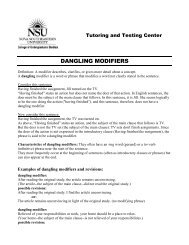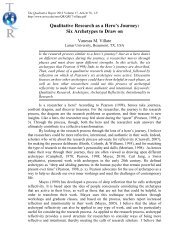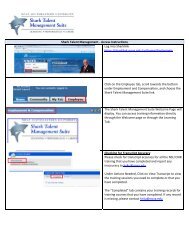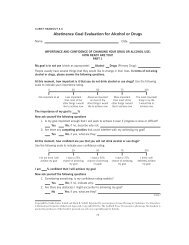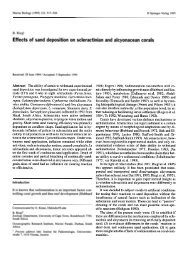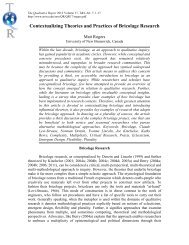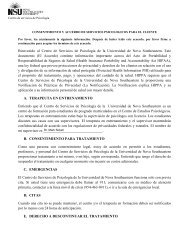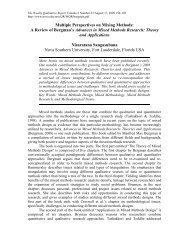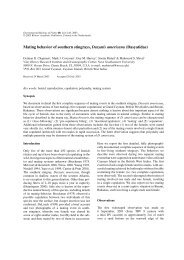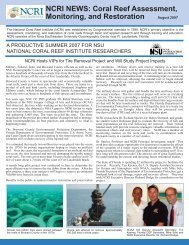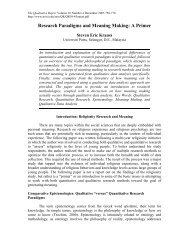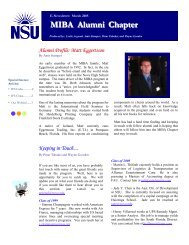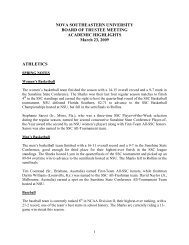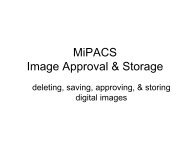11th ICRS Abstract book - Nova Southeastern University
11th ICRS Abstract book - Nova Southeastern University
11th ICRS Abstract book - Nova Southeastern University
Create successful ePaper yourself
Turn your PDF publications into a flip-book with our unique Google optimized e-Paper software.
21.815<br />
Dilemma in Coral Conservation And Community Livelihoods. A Case Study Of St.<br />
Martin’s Island, Bangladesh.<br />
Mohammad ISLAM* 1<br />
1 Norwegian College of Fishery Science, <strong>University</strong> of Tromso, Tromso, Norway<br />
St. Martin’s Island is a marine protected area under the designation of ecologically<br />
critical area. The island is the only coral enriched ecosystem of Bangladesh having global<br />
biodiversity significances. The present study based on secondary data, primary data<br />
survey, participatory observation and in-depth interviews. The study aims to map out the<br />
dilemma in government efforts to coral conservation and community livelihoods. Heavy<br />
dependence of the community on fishery resources poses a particular threat to increasing<br />
vulnerability of the island’s economy to potential adversity if the fishery ruin. Other<br />
marine resources of the coral ecosystem also play an imperative role in employment and<br />
income generation for the numbers of island dwellers. Government legislations for<br />
conservation of marine resources and increased tourism activities have resulted in<br />
conflict and anger from affected local communities. Increased tourism activities opened a<br />
new avenue of revenue generation for some island dwellers but mostly to the outsiders of<br />
the island. Thriving tourism practices in the island have negative impacts on the fragile<br />
coral ecosystems of the island. Fishers of the island are losing their land due to<br />
encroachment of the elite hotel owners for developing infrastructures. Restrictions on the<br />
resources exploitation compelling many people jobless, having negative impacts on<br />
livelihood security. So, for subsistent living, over-exploitation of coastal fishery<br />
resources and uses of destructive fishing gears, excessive extraction of corals, sea weeds<br />
and algae goes unabated. Thus a conflict has unfolded between government efforts for<br />
coral resources conservation and that of managing the resources in a way that does<br />
impact negatively on the economic benefits and livelihood security of the island dwellers.<br />
21.816<br />
Training For Local Inhabitants Of A Coral Reef Island At Southern Caribbean in<br />
Order To Develop Activities Sustainable With Ocean Life<br />
Carlos BOHORQUEZ* 1<br />
1 National Fisheries Center, SENA, Cartagena, Colombia<br />
Local inhabitants of some coral reef island near to the Colombian mainland on the<br />
Caribbean coast have limited education and labour opportunities. These people depend on<br />
the natural offer to obtain an income. SENA is offering to them technical courses that<br />
give to them skills for work and alternatives to generate an economic activity. During<br />
some courses offered in Isla Fuerte, Colombian Caribbean were design some ecological<br />
projects including mangroves restoration, underwater tour, fishery turism and sea turtle<br />
rescue and education visitor center between others. The last two projects, have a real<br />
viability in order to be sustainable and enough profit to assist the people involved<br />
covering their living expenses on a seasonal base. In the middle term future in would be<br />
true during the complete year if current turist and occasional visitants maintain a<br />
permanent interest in use those services and if there the trend to increase the tourism is<br />
maintained. Projects as mangroves restoration and underwater tour have some strong<br />
difficulties as not enough technical acknowledgement, minimal experience, no demand<br />
and very scarce funding sources. The remain population still have to obtain their survival<br />
from traditional activities as agriculture and some cattle, activities not environmental<br />
friendly as the projects mentioned before. Other business ideas that would employ a lot of<br />
people on the island with minimal impact on the coast and near shallow coral reefs as a<br />
call center has not been explored and currently there is not human resource with the<br />
necessaries capacities available for it.<br />
Poster Mini-Symposium 21: Social-Ecological Systems<br />
21.817<br />
Practice Makes Perfect? An Iterative Approach To Participatory Modelling For Coral<br />
Reef Management<br />
Deborah CLELAND* 1 , anne DRAY 1 , Rollan GERONIMO 2 , Annabel TRINIDAD CRUZ 3 ,<br />
pascal PEREZ 4<br />
1 RSPAS, ANU, canberra, Australia, 2 IMS, UPS, QUEZON CITY, Philippines, 3 IMS, UPS,<br />
Quezon city, Philippines, 4 RSPAS, ANU, Canberra, Australia<br />
As human activities continue to devastate coral reefs across the globe, new and innovative<br />
approaches are needed to link government, communities and researchers to improve reef<br />
management. As these new approaches are developed, it is crucial to explore how effectively<br />
they are able to bring together diverse stakeholders to integrate knowledge and build<br />
relationships to support sustainable reef management. To this end, this paper uses an iterative<br />
methodology, drawing upon an initial participatory modelling experiment completed in Mexico,<br />
to guide the design of a new model and role-playing game ‘ReefGame’, which was<br />
implemented in the Philippines.<br />
This research provides two important lessons for developing participatory modelling for coral<br />
reef management. Firstly, a comprehensive understanding of local complexities is critical in<br />
developing models that can effectively engage local people in dialogue and learning processes.<br />
Secondly, and notwithstanding the central role of contextual detail, explicitly extracting<br />
structural similarities over differing social and economic contexts plays an essential role in<br />
improving useful outcomes both for reefs and the people who depend on them.<br />
21.818<br />
The International Year Of The Reef 2008 in Germany<br />
Georg HEISS* 1 , Reinhold LEINFELDER 1<br />
1 Museum of Natural History Berlin, Berlin, Germany<br />
This poster will highlight activities linked to the International Year of the Reef – IYOR 2008,<br />
within Germany as well as coral reef research and outreach activities with German participation<br />
globally.<br />
The concerns of coral reefs have attracted more attention in developed countries in recent years,<br />
mostly linked to the attention that was directed to global climate change and the accelerating<br />
loss of biodiversity. The fact that coral reef ecosystems are seen as being the first victims of<br />
climate change has contributed to this situation.<br />
Shortly after the declaration of IYOR 2008 in Cozumel in October 2006, German scientists,<br />
NGOs and government representatives came together to form an IYOR coordination team and<br />
an Advisory Council, which started their activities in early 2007.<br />
The high priority allocated to the issues concerning coral reefs and the role that European<br />
countries have to play is demonstrated in the fact that Federal Environment Minister Sigmar<br />
Gabriel agreed to act as the patron of IYOR 2008 Germany.<br />
Main goals of IYOR Germany are to inform the public and decision makers about the threats<br />
coral reefs are facing, and to intensify international cooperation between Germany, coral reef<br />
countries and international organisations in research, conservation, public outreach and<br />
sustainable development.<br />
At submission time (December 2007) media attention had already increased and several articles<br />
were published. Daily and weekly print publications, TV stations, diving and travel magazines,<br />
as well as popular scientific publications are planning to focus on coral reef themes, and in<br />
particular on the global coral reef crisis, throughout the year.<br />
Special exhibitions and symposia are in preparation, seminar series for the general public are<br />
planned in several cities, <strong>book</strong>s on warning signals from coral reefs are being prepared. Movie<br />
theatres will feature films about coral reefs and companies will support activities in-kind and<br />
financially.<br />
www.iyor2008.de<br />
468



